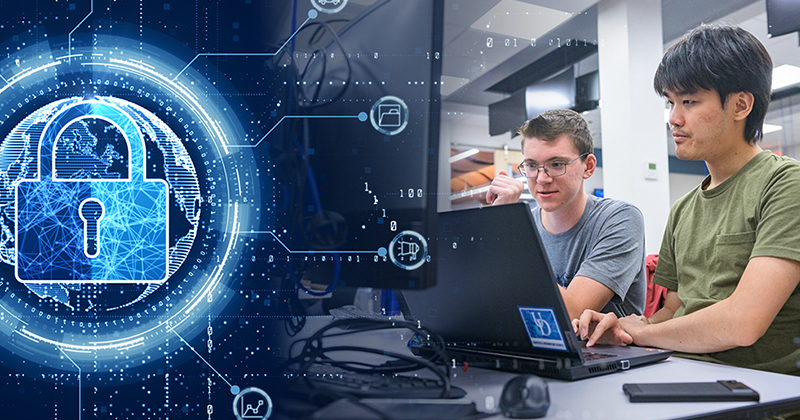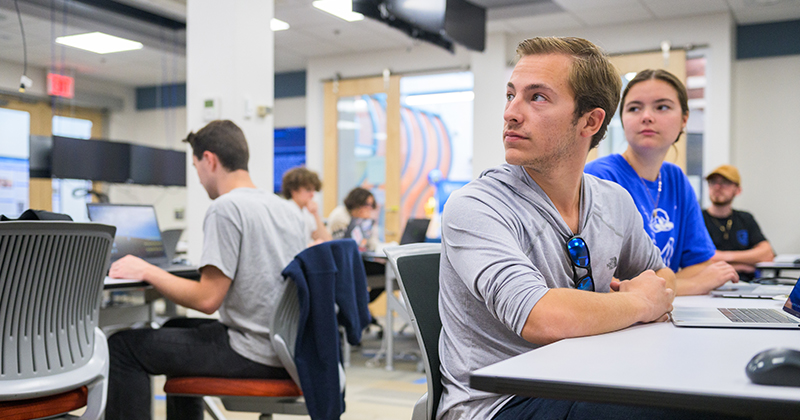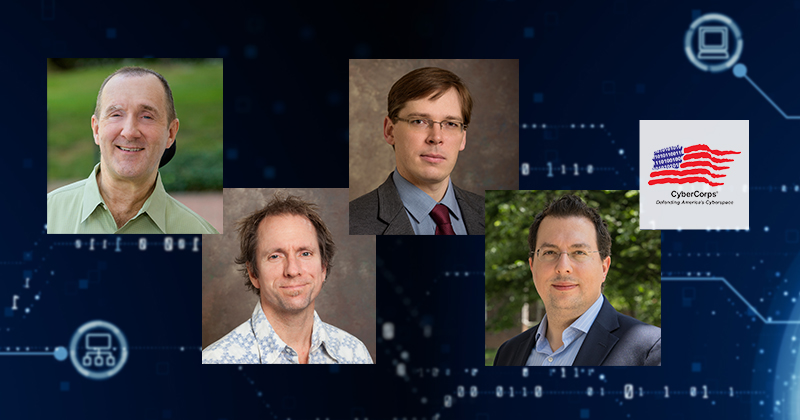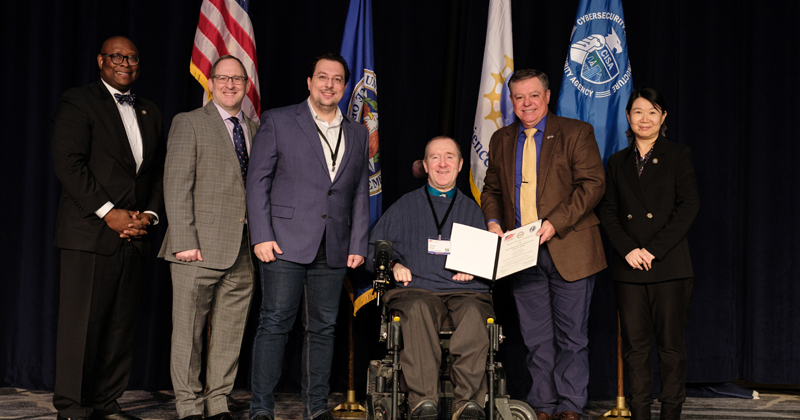


Supporting cybersecurity scholars
Photos by Evan Krape, Kathy F. Atkinson and Ambre Alexander | Photo illustration by Joy Smoker February 12, 2024
UD Engineering receives $3.4 million from NSF’s Scholarships For Service program to support top-tier cybersecurity students and bolster professional development opportunities
In 2012, the University of Delaware became the lead institution of a National Science Foundation (NSF) Collaborative Scholarships for Service (SFS) Capacity Building project to establish cybersecurity-focused educational programs.
Since then, UD has grown to become a leader in this area by providing students with the skills and experiences they need to tackle emerging threats in the digital realm thanks to its range of academic offerings (including a new cybersecurity engineering undergraduate program launched last fall), access to hands-on training programs, and the innovative research projects housed under UD’s Center for Cybersecurity, Assurance and Privacy (CCAP).
Now, the College of Engineering’s Department of Electrical and Computer Engineering and UD’s CCAP will build off the strengths of its existing program offerings with additional support from NSF’s CyberCorps SFS program. This new program will not only provide scholarships for top-tier undergraduate and graduate students who will go on to serve in crucial roles across federal, state, local and tribal security sectors, it will also bolster UD’s offerings in professional development, career preparation and hands-on cybersecurity training.
“As Cybersecurity plays an ever-increasing role in our digital landscape, and more and more of life moves online, it is more important than ever that we have a contingent of trained professionals ready to address virtual threats of any kind,” said U.S. Senator Chris Coons. “To see the NSF investing significant resources in Dr. Ken Barner’s team and the University of Delaware reinforces for me what I already knew: Delaware is at the forefront of technological advancement, and UD is leading the way in preparing our country to be as safe and prepared as possible in the digital age.”

The principal investigator (PI) of UD’s “Defending Cyberspace through Active Learning” program, which includes $3.4 million in funding over five years, is Kenneth Barner, Charles Black Evans Professor of Electrical Engineering. Co-PIs are associate professors Stephan Bohacek and Andrew Novocin, and assistant professor Nektarios Tsoutsos.
“Getting to be part of this SFS cohort was a natural next step for furthering our degree offerings,” Barner said. “Now that we have all the infrastructure, and there's a great demand for our cyber security courses, we can significantly strengthen our current program offerings in a way that supports our students and helps launch them on their careers.”
"Securing Cyberspace is an identified Engineering Grand Challenge for personal privacy and national security while there remains a critical cybersecurity skills gap and workforce shortage,” said professor and department chair Jamie Phillips. “I am extremely pleased to see the establishment of our CyberCorps SFS program at the University of Delaware to play our part in addressing this national and global need through excellence in educating the cybersecurity workforce of tomorrow."
“As Delaware’s former Secretary of Labor and the founder and co-chair of the Bipartisan Future of Work Caucus in Congress, preparing people in Delaware and across the country to take on in-demand jobs has long been a top priority of mine,” said Rep. Lisa Blunt Rochester. “Our country is currently facing a significant cybersecurity workforce shortage with more than 500,000 open cyber roles nationwide and more than 2,000 openings in Delaware alone. I’m excited by today’s announcement which will bring over $3 million in federal funding to support cybersecurity students at the University of Delaware’s College of Engineering through this innovative new program as they prepare to take on critical cybersecurity roles, helping strengthen our cybersecurity workforce, grow our economy, and protect our personal data and national security.”
Unique opportunities for cybersecurity scholars
Awarded to five new institutions this fiscal year, the SFS program provides scholarships for students who enroll in the cybersecurity engineering bachelor of science program, the master of science in cybersecurity program, the cybersecurity 4+1 BCPE/MS program, and students pursuing a cybersecurity-focused PhD, all of which are part of UD’s electrical and computer engineering department. The first cohort of SFS scholars will join the UD community starting next fall and will receive a stipend, an allowance for professional development activities and computers, and have their tuition paid in full for up to two years.
One key feature of the SFS program is the requirement for scholarship recipients to work in cybersecurity-related jobs for federal, state, local or tribal government organizations for the same or longer length of time as their scholarship. To help students meet additional internship requirements for the SFS program, this year UD will pilot a summer internship program with the Delaware Department of Technology and Information (DTI) and begin fostering additional partnerships with local and regional governmental organizations.

“As a UD engineering alumnus, I am proud of the University’s continued commitment to innovation and preparing students with the knowledge and practical experience needed to meet the challenges of a rapidly evolving cybersecurity landscape. DTI is thrilled to partner with UD scholars on this cybersecurity internship program,” said Delaware Chief Information Officer Greg Lane. “Cybercrime is growing exponentially, and Delaware — like other states — needs a pipeline of these specially trained professionals to address emerging threats to protect our critical infrastructure, sensitive data, and public services. These experts are on the frontline of maintaining the State’s cybersecurity posture and safeguarding our networks. Like those who entered the IT field a few decades ago, these students will find themselves on the cutting edge as the next generation of leaders in the cybersecurity space.”
Not only will UD’s SFS scholars receive generous financial support which includes $27,000 per year for undergraduates, $37,000 per year for graduate students, and $6,000 allowance per year for conference travel and professional certifications along with free tuition and job placement support, but they’ll also be able to gain cutting-edge cybersecurity skills thanks to UD’s course offering that balances cybersecurity theory with hands-on practice, including the ability to participate in cyber defense and warfare training in the Cyber Range. UD’s well-established cybersecurity curriculum played a pivotal role in UD being designated as a U.S. National Security Agency’s (NSA) Center of Academic Excellence (CAE).
“We have a significant number of dedicated cybersecurity classes. A lot of our classes are also very hands-on, and I think that's one of UD’s strengths,” added Bohacek. “The SFS scholarships will now be a great way to expand our program, increase our enrollment, and reach a wider set of the best, brightest, and most diverse students we can have.”
Outside of courses and internships, UD students engage in a breadth of cybersecurity activities, including the Cybersecurity Scholars Program, Distinguished Lecture series, and Capture The Flag competitions to enhance their practical, career-ready cyber skill sets further. Now, thanks to this SFS program, the department aims to create a new professional development course (in partnership with UD’s career center), launch a mentorship program for women in cybersecurity, and provide additional mentoring and advisement support.

The future of cybersecurity at UD
Along with attracting top-tier cybersecurity students to UD, this new scholarship program will further enhance UD’s cybersecurity research through the CCAP. Not only will being part of this SFS community help UD foster collaborations that will lead to new research innovations, but it will also enable stronger ties with government agencies such as the National Security Agency, the Federal Bureau of Investigation, Homeland Security, and the U.S. military.
“UD will be part of a prestigious group of universities whose students can earn a cybersecurity degree and then get direct placement in elite government agencies,” said Tsoutsos, referring to the fact that the SFS institutions includes just 100 universities from the last 23 years. “It will have a significant impact on our efforts to grow our cyber security programs here at UD, which will help us attract more faculty, students, and researchers as part of a positive loop that will allow us to pursue more cutting-edge cybersecurity and privacy research.”
After attending the SFS job fair in Washington, D.C., this January and speaking with a few of the nearly 1,000 SFS scholars who attended, Barner is excited for the vibrancy that the next generation of cybersecurity students will bring to UD thanks to this new program.
“Cybersecurity was a niche area just ten years ago, and now it's a significant component of what we do here in the college and our department,” he said. “I was really energized by the SFS students, who were all engaged and excited about their internships and experiences they had in the programs, and I think this is going to be a great program for UD and its students.”
Contact Us
Have a UDaily story idea?
Contact us at ocm@udel.edu
Members of the press
Contact us at 302-831-NEWS or visit the Media Relations website

